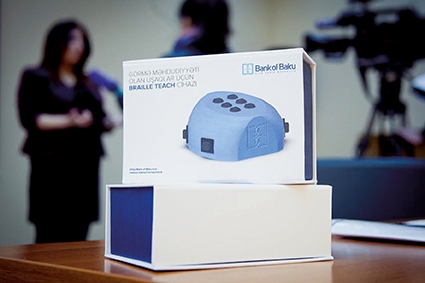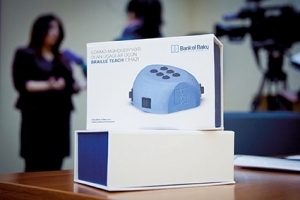New Technology Teaches Braille with Fun
Interview
Braille Teach is a new product of the company Horizon Next, created by Rashid Aliyev, an entrepreneur and inventor based in Baku, Azerbaijan. The product is an interactive hand-held device designed to help teach the Braille alphabet quickly and in a fun way using audio feedback. The company’s mission is that “Braille literacy must be accesible to all blind and visually impaired people.”
GEORGIA TODAY sat down with Aliyev to learn more about the project.
What inspired you to start Braille Teach?
My previous project was called Braille Pad – a tablet with tactile display. When I was doing research, I noticed that it's hard to learn Braille and existing devices and methodologies are too expensive. I decided to work on a simple solution and did it. This simple tablet for seniors includes a wireless charging cradle, setup guide, and handy stylus for navigation.
Who is your intended audience?
Mostly pre-school children who are blind or visually impaired who need to learn braille, but not only them – their family members, parents and those who want to learn braille for themselves or to teach it.
I’d also like organizations who have social responsibilities or who work on education for disabled (blind and visually impaired) persons to get involved, and for those who help manufacture such devices and/or those who apply new technologies in education to use Braille Teach.
What are your long-term goals for BT?
Make education available to all. In the long term, I want to develop and update the device, include games, and create new versions.
Who has supported BT?
The Ministry of Education of Azerbaijan, RNIB (Royal National Institute for the Blind, UK), Baku American Center, Mujitler Atelyesi (Turkey), "Hope" NGO (Ukraine), School #5 for BVI (Azerbaijan), Bank of Baku (Azerbaijan), UAFA (United Aid for Azerbaijan), and some other organizations and individual persons.
What kind of response have you had from the communities you’ve been working with?
We continue working with organizations and individuals and are always improving our product. We got feedback from them and improved our device. We are open to all feedback. Some of the changes we have made already:
a. Change button sizes (there are now big and small button versions);
b. Additional headphone jack;
c. Additional languages (currently: English, Russian, Azerbaijani, Ukrainian and German);
d. Additional "challenging" game
What is the next immediate step for BT?
Going into mass production. For that reason, we are seeking grants, investments. We'll be happy to get all kind of help and support – especially from the United States!
For more information on Braille Teach, including how to support the product, go to www.brailleteach.com/
Interview edited for clarity.
By Samantha Guthrie












